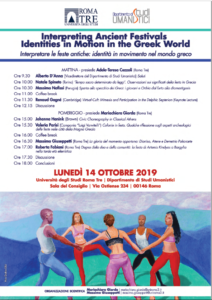Interpreting Ancient Festivals: Identities in Motion in the Greek World(Roma Tre, Oct. 14, 2019)
Recent scholarship on ancient Greek festivals has witnessed a major breakthrough in the ’80s. In the wake of ground-breaking inquiries carried out by modern historians (Edward Muir, for instance), scholars of ancient history and literature began to capitalize on crucial insights developed particularly in the fields of anthropology (e.g. Turner, V. ed., Celebration: Studies in Festivity and Ritual. Washington (DC), 1982) and social sciences. In a seminal study devoted to Greek festivals, W.R. Connor (“Tribes, Festivals, and Processions: Civic Ceremonial and Political Manipulation in Archaic Greece.” JHS 107 (1987): 40–50, at 41) argued that ‘Civic rituals were commentaries on the city, its internal dynamics, and its relationship with the outside world. In commenting upon civic realities, the rituals illustrated an ideal arrangement of human relationships, created a homily that stimulated or altered some formal political and social ideas, and provided a medium for discourse among the constituent classes and the literate elite and the masses’. Following Muir, Connor argued that, in ancient Greece as much as in Renaissance Venice, festivals and public ceremonies were ‘part of the symbolic expression of civic concerns’, ‘a difficult to read but ultimately eloquent text about the nature of civic life’.
The Roma Tre workshop “Interpreting Ancient Festivals: Identities in Motion in the Greek World” aims to take one step further the metaphor of festivals and civil rituals as ‘eloquent texts’ by exploring its heuristic potential, especial in terms of creating, negotiating or contesting collective identities. How can we read these ‘texts’? Are they part of a larger ‘language’? Surely, festivals are multi-layered events that activate several types of language, often inextricably interconnected with each other; ritual acts, for instance, are carried out against the backdrop of civic or sacred spaces which are semantically charged in their own right. How is meaning created and/or communicated within this larger framework? How does this communication frame relate to broader issues of either identity at different levels (e.g. social classes, individual cities, larger networks) or multiple identities (e.g. in cultural, social, political, religious terms)? How can our different approaches contribute to the collaborative effort of interpreting these complex phenomena?
These are only a few questions we would like to explore during our workshop. We strongly encourage the dynamic interaction between all participants, who are specialists in different areas of expertise (archaeology, epigraphy, history, history of religions, literature). We do hope that the workshop will be also an occasion to discuss and develop methodologies across disciplinary boundaries.
Conveners: Mariachiara Giorda (Roma Tre) (mariachiara.giorda@uniroma3.it<mailto:mariachiara.giorda@uniroma3.it>)
Massimo Giuseppetti (Roma Tre) (massimo.giuseppetti@uniroma3.it<mailto:massimo.giuseppetti@uniroma3.it>)
Monday, Oct. 14, 2019
Sala del Consiglio
Dipartimento di Studi Umanistici – Università Roma Tre
Via Ostiense 234 – 00146 Roma
Morning
Chair: Adele-Teresa Cozzoli (Roma Tre)
9:30h Alberto D’Anna (Deputy Director, DSU) Saluti
10:00h Natale Spineto (Torino) ‘Tempo sacro determinato da leggi’. Osservazioni sui significati della festa in Grecia
10:30h Massimo Nafissi (Perugia) “Sparta allo specchio dei Greci: i giovani e Orthia dal furto alla diamastigosis”
11:00h Coffee break
11:30h Renaud Gagné (Cambridge) “Virtual Cult: Mimesis and Participation in the Delphic Septerion” (Keynote Lecture)
12:15h Discussion
Afternoon
Chair: Mariachiara Giorda (Roma Tre)
3:00h Johanna Hanink (Brown) “Civic Choreography in Classical Athens”
3:30h Valeria Parisi (Campania “Luigi Vanvitelli”) “Colonie in festa. Qualche riflessione sugli aspetti archeologici delle feste nelle città della Magna Grecia”
4:00h Coffee break
4:30h Massimo Giuseppetti (Roma Tre) “La gloria del momento opportuno: Dioniso, Atene e Demetrio Poliorcete”
5:00h Roberta Fabiani (Roma Tre), “Degna della dea e della comunità: la festa di Artemis Kindyas a Bargylia nella tarda età ellenistica”
5:30h Discussion
6:00f Conclusions
La partecipazione al workshop è valida come aggiornamento per idocenti della scuola secondaria. Il workshop è stato inserito nel portale S.O.F.I.A.del MIUR con l’identificativo 36546.
For further info: Massimo Giuseppetti (massimo.giuseppetti@uniroma3.it<mailto:massimo.giuseppetti@uniroma3.it>)


